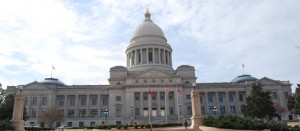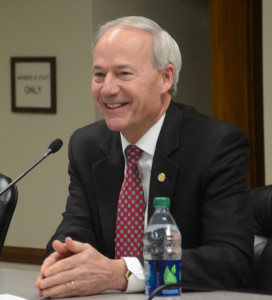 By Steve Brawner
By Steve Brawner
© 2016 by Steve Brawner Communications, Inc.
If you’re helping a lot of people but contributing a few drops in the bucket to a big problem, should you stop helping those people? That’s one of the issues confronting legislators.
What’s helping people is the private option, which Gov. Asa Hutchinson is trying to rebrand as Arkansas Works.
Created in 2013, the program provides health insurance for Arkansans with incomes up to 138 percent of the federal poverty level, which is $11,880 for a single person. It uses Medicaid dollars – Medicaid being a federal-state program that serves lower-income people – that were made available by the Affordable Care Act (a.k.a. Obamacare). When the U.S. Supreme Court said states could choose whether or not to participate, many Republican states said no. Arkansas instead received federal permission to use the Medicaid money to buy private insurance.
It expires this year. On Thursday, legislators voted to extend it as Arkansas Works. But it lacked the 75 percent margins it will need to be funded in a fiscal session that begins next week. So we’ll see.
As of the end of January, 267,590 Arkansans were eligible. About 40 percent of recipients have no income. The others do, but many can’t get insurance. Speaking to legislators April 6, Hutchinson pointed to a pregnant mother employed at a West Memphis sandwich shop, and a 60-year-old painter and handyman from Jonesboro whose heart condition reduced his income so he couldn’t afford coverage. They’re both on the private option.
However, the program also is a few drops in the bucket of another problem. If it survives, Arkansas Works will bring about $9 billion in federal funds into Arkansas from 2017-21. During that time, the White House Office of Management and Budget projects another $3.766 trillion will be aded to the national debt, which is already more than $19 trillion. The math says Arkansas’ $9 billion would be one quarter of one percent of the new debt being created.
Opponents say Arkansas should do its part and say no to the money. The country already owes $19 trillion because too few will say no.
Sen. Terry Rice, R-Waldon, the lone no vote against Arkansas Works in a committee meeting Wednesday, made that point, saying, “I want to be as helpful to people as I can, but we are enslaving future generations, our children and grandchildren, to debt that we are irresponsibly putting on their credit card.”
But while the Affordable Care Act giveth, it also taketh away. The various taxes and changes to the law will take $5 billion out of Arkansas over that same time period. If Arkansas says no, it loses that money with nothing to offset it. Nineteen Arkansas hospitals are considered financially vulnerable, and without Arkansas Works, some will close. It’s happened in other states that rejected the money.
If Arkansas says no, there’s no guarantee the national debt will be $9 billion smaller. The federal budget is a huge, swirling pot of money. Meanwhile, the majority of other states – including those much richer than Arkansas – are taking the money. Louisiana, which first said no, recently elected a Democratic governor promising to say yes. So Californians and Louisianans will get health coverage, but the West Memphis working mom and the Jonesboro painter probably will lose theirs.
That’s why Rep. Charlie Collins, R-Fayetteville, a sponsor of the Arkansas Works bill, said in committee, with passion and emphasis, that he would support killing the program, but only on one condition: “Not only punishing our people.”
Perhaps the bigger issues are how the private option/Arkansas Works indirectly affects the national debt. You can say it grows government and contributes to a culture of dependency, which adds to the debt.
You also can say it’s a more honest way of paying for health care. The uninsured still seek care, but they wait until they are sicker, and then they can’t afford to pay for it. Then the costs are passed on to taxpayers, current and future, through government reimbursements to hospitals. At the same time, people who have insurance pay higher premiums. Local taxes are raised to save the hospital that’s been giving free care. The system shuffles money around like a streetside shell game scam artist. That process steals money from the future, too. It’s just not as obvious.
Lawmakers will need the wisdom of Solomon on this one. The bucket is filling up, but in this case, the drops are painters and sandwich shop employees.
Related:
Cynicism, watchfulness, the presidential campaign and Arkansas Works.
Arkansas Works and the private option: What’s all the fuss about?
